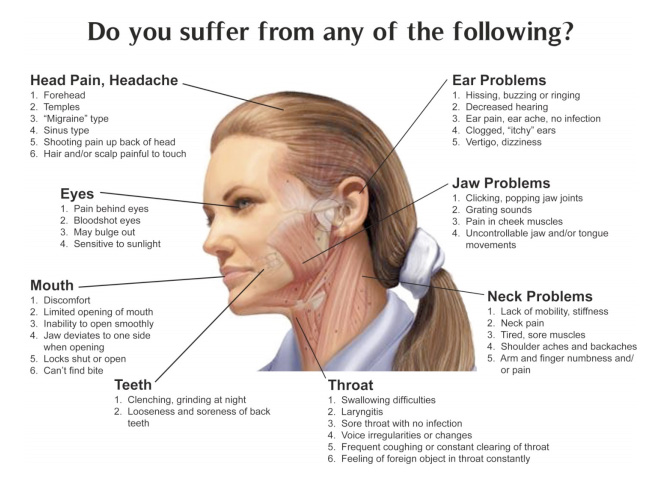What is TMJ/TMD?
 TMJ disorder causes pain and discomfort in the jaw and head area. It can develop when one or both of the temporomandibular joints stop functioning properly.
TMJ disorder causes pain and discomfort in the jaw and head area. It can develop when one or both of the temporomandibular joints stop functioning properly.
Symptoms
The symptoms associated with TMJ disorders will vary from person to person, depending on theunique causes of their discomfort. TMJ symptoms can include the following:
- Jaw joint pain: For those suffering from TMJ disorders, jaw joint pain is one of the most common complaints. Many patients notice a clicking, popping, or grinding sound when they chew or yawn and describe the pain they are experiencing as either dull and constant or sharp and sporadic.
- Ear pain: Many TMD sufferers do not know that their TMJ is the source of the ear pain they are experiencing, and assume instead that it must be caused by an ear infection or another inner ear problem. Radiating pain from the affected joint, nerves, or other surrounding structures may seem like it is originating from the ears.
- Headaches: Moderate to severe headaches can be caused by TMJ disorders. Improper articulation of the jaw joint can strain muscles and ligaments that attach to the skull, and even pinch nerves, causing painful headaches. Those with headache pain may also be experiencing TMJ related symptoms such as neck pain.
- Tooth pain: TMJ is most often linked to tooth pain in those patients who routinely clench or grind their teeth. The extreme pressure absorbed by the teeth and jaw joints while clenching or grinding can cause serious pain in the cheeks and damage in both areas.
Causes
There are many causes of TMJ disorders and jaw joint pain, including:
- Cartilage wear and tear: The cartilage disks that pad the TMJ become worn or displaced, causing painful grinding of the jawbone.
- Dislocated TMJ: Dislocation of the joint is indicated by popping and cracking noises when the jaw is opened or closed, and may negatively affect movement of the jaw and strain the musculature of the jaw, face, and neck.
- Clenching and grinding: Habitual clenching and grinding of the teeth places extreme pressure and strain on the joints and is one of the most common causes of TMJ disorders. The added stress on the jaw joint can cause wear and tear of the cartilage disks, and may even cause the jaw joint to become dislocated.
- Misaligned bite: If the bite of the upper and lower teeth is not aligned properly, everyday jaw movement like chewing can take a toll on the TMJ and strain the surrounding musculature.
- Arthritis: Arthritis can cause uncomfortable inflammation of the TMJ and may also result in swelling in the adjoining tissues, ligaments and muscles. Those with arthritis may experience difficulty opening and closing their mouth, as well as other painful TMJ symptoms.
- Trauma: any kind injury or blow to the joint.

To learn more, visit our Tucson Sleep Disorders site.